Story and photos by Meghan Muffett, courtesy of Sisterhood Boutique – Pillsbury United Communities.
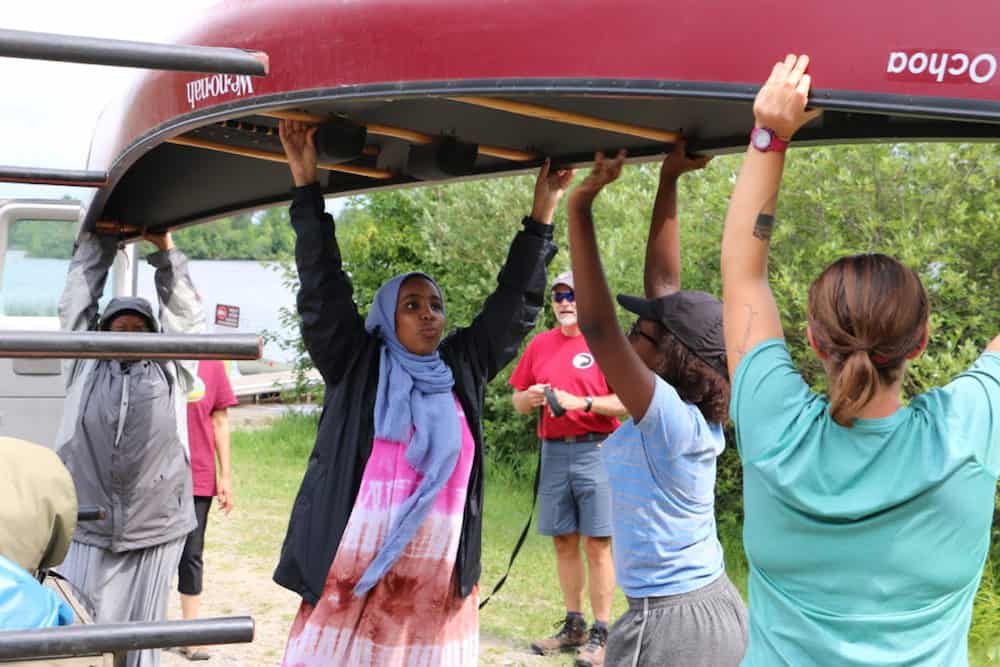
“They’re gaining new skills. They have this courage and strength that they didn’t know that they had before. A trip like this is a milestone.”
– Yasameen Sajady, Sisterhood Boutique Social Enterprise Manager
The Sisterhood Boutique was developed by East African women between the ages of 14 and 23 who reside in the Cedar-Riverside neighborhood of Minneapolis, and participate in the Brian Coyle Center Youth Entrepreneurship Program. Young women involved with the program are learning a variety of personal and professional skills from business development to event planning, while the colorful variety of clothing and accessories available at the shop provide affordable clothing options for residents of the neighborhood.
From July 13-20 of this year, Sisterhood Boutique took a group of young women up to the Boundary Waters Canoe Area. This was the third year in a row SB has facilitated this expedition, always guided by Big City Mountaineers.
On this trip, youth camped for 8 days, paddled 39 miles, and portaged 350 rods where they carried 80 lb canoes on their shoulders and 50 lbs bags on their backs.

These expeditions are meant to introduce youth to the outdoors (especially women!) through backcountry camping and canoeing where they are taught how to be independent in the wilderness. Youth learn several technical skills such as how to set up a tent, purify water, cook and clean outside, and how to paddle a canoe—all while making sure to take care of the land and ‘leave no trace’ in the process. In addition to those more hands-on skills, youth are simultaneously enhancing their communication and leadership skills, pushing themselves to new limits, and experiencing what it means to work as a teamwork at a whole new level.
What were some of their skills learned? Toughest parts? Things they feel most proud of? Scroll on below to read some trip reflections and see photos!
Sara, 13
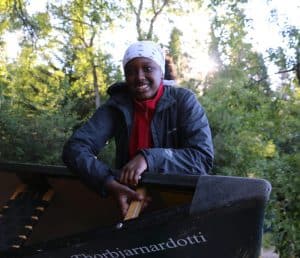
What strengths have you used on the expedition? At first I didn’t have courage to carry a canoe but later on I noticed that like three people on our team actually stood up to carry a canoe and I wanted to be a part of them so I stood up and did that too.
What specific skills did you learn? Being strong is not about your muscle or anything. If the strength is not coming from your heart, then you don’t actually really mean it.
What accomplishment on the trip did you feel most proud of? Leaving my house and actually living outdoors instead of staying locked indoors. I’m proud of that.
Ikran, 16
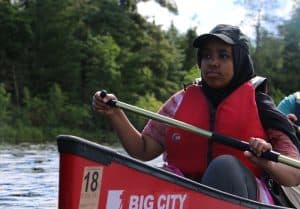
What specific skills did you learn? I learned how to make a fire. I learned how to build a tent, which I never knew before this. I learned how to I guess like, change and do everything like use the bathroom outside in the forest.
Did you learn or realize anything new about yourself? Before this I didn’t know I liked to hike and climb rocks and trees and stuff but after doing it I was like, you know I really like this.
What will you miss the most about the experience? The thing I’ll miss the most is probably seeing the stars at night because in the city you only see like one star and then it ends up being a plane or something. That and the birds, especially the one that makes that one sound.
Amal, 17
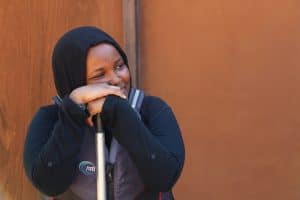
What specific skills did you learn? A lot. I learned how to put up a tent, how to survive out in the wilderness, how to use a canoe properly, how to carry a canoe—that was the hard part.
Did you learn or realize anything new about yourself? I realized just how much I liked nature. I never knew how much before but being out there and seeing the stars in the night sky—I really liked it.
What was your favorite and least favorite part? My favorite part of the trip would be being with everyone and being able to joke around with people that I just met. And my least favorite part would be my sunburn—my face is all red now—but it’ll go away so it’s all worth it.
Hibbo, 13
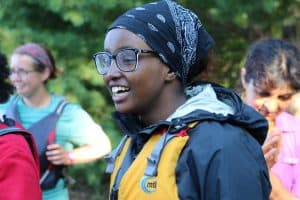
What specific skills did you learn? Communication. My communication with people got better because I don’t usually like doing that stuff.
What accomplishment on the trip did you feel most proud of? The biggest accomplishments that I’m proud of is that we canoed for like 10 hours and we did like 17 miles that day so then that was kind of hard. It didn’t even feel like 10 hours; it felt like 2 hours.
What will you miss the most about the experience? The landscapes and stuff. How the lakes look.
Fardowza, 17
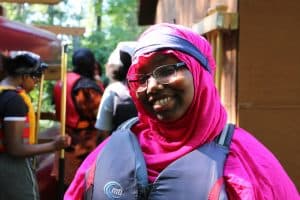
What specific skills did you learn? I learned that after some hardship, there comes an ease. After going through some really tough situations, we came across a nice place to stay, played a little, had a swim in a cool lake, walked on a beach, experienced something new.
What accomplishment on the trip did you feel most proud of? I am proud of that I did it. I went through two countries and back, through many lakes, got there in one piece.
Anything else you want to say about the trip? I would say people should try going on it. I didn’t know Boundary Waters existed before this. And it’s a fun way to learn more about Minnesota. I thought Minnesota was a small, quiet place nobody knows about. But, it’s pretty fun.
Yasameen
Sisterhood Boutique Social Enterprise Manager
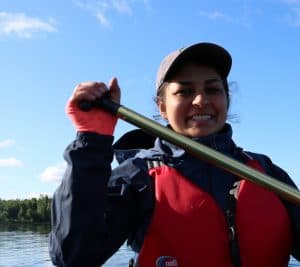
Our trips to the Boundary Waters are really important to us because it’s an opportunity for young women to learn about the outdoors and experience the outdoors through a guided experience.
What were group spirits like at the beginning vs. the end of the trip? When you’re choosing to go on a trip like this, it takes a lot of courage to be vulnerable. It takes a lot of courage to say that you will sleep in the woods with strangers for five days. The beginning of trips, a lot people tend to be really shy, anxious, pretty nervous. Really upset that they don’t get to use their phone. Really upset that they have to use the bathroom outside. That’s the beginning of the trip. By the end of the trip, people are more comfortable being themselves. I think people are really proud of themselves for challenging themselves in this way. By the end of the trip, everyone comes around and understands that the hard work is worth it and that pushing themselves is worth it and being able to see the animals that they saw and being able to connect with other women and other peers was really important to them.
This was your 2nd year taking youth on a BWCA area trip. Do you have any new lessons learned or reflections you’d like to share? Sisterhood has been going on this trip for three years. This was my second year going on this trip. This trip reinforced how special these opportunities are for young people and for young people to be connected with nature in this way and with themselves in this way. One thing that I took time to reflect on was building that trust with young people before the trip, on the trip, and after the trip. I didn’t know any of the young people that were on this trip before and they amazed me. I loved getting to know them and that was my favorite part of the trip.
What was your favorite and least favorite part? My favorite part about the trip was being disconnected for eight days and being able to connect with people without distractions. Being in canoe with the same person for eight hours is really intense. What do you talk about? You find things to talk about. You find new energy that you didn’t know that you had. You learn something new about the person that you didn’t have any idea you had in common with them. You really dig deep and find opportunities to connect with humans that you had no idea that you knew how to do and I 100% believe it’s because I didn’t have my cell phone in my hand.

